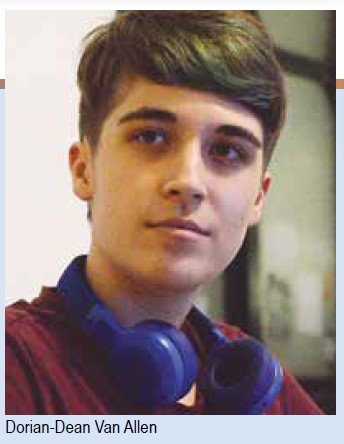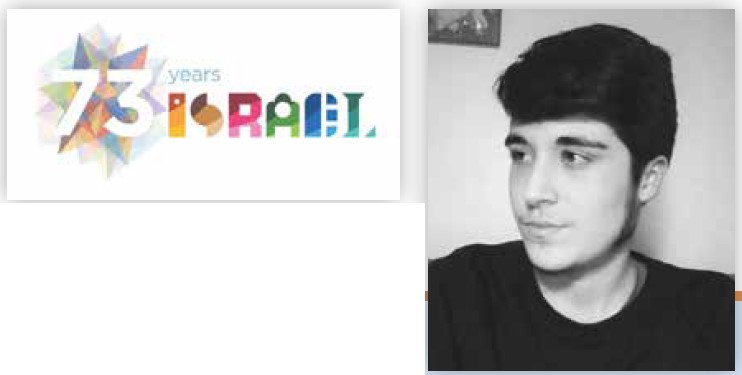
By Dorian-Dean Van Allen–
Growing up transgender is never easy, especially when it comes to living in different countries with different rules and levels of acceptance. Fighting for trans rights and the right to be your true self transcends national borders. It does not matter whether you are born in the United States or in Israel; coming to terms with your gender identity and then having others accept that identity pose monumental challenges no matter the language.
Coming to terms with one’s transgender identity is unique to every individual. Many understand that they are trans from a young age. But for me, that was not the case. I started to feel that I was not a girl around the age of fourteen, and I did not know what I was.
Things began to become clear two years later when I attended my first pride parade in Tel Aviv with my best friend, Rotem. There, for the first time ever, I saw examples of what it meant to live a life that was authentic to my own personal feelings. I watched my trans brothers and sisters celebrate their identity in public. I suddenly had the words to describe myself, and it was at that time that I could finally articulate to my friend that I did not identify as female.
Even then, I was not sure exactly how I identified. I just knew I was not a woman. Thankfully, my friend welcomed my revelation with open arms during this time of discovery.

It was only after becoming involved with IGY, the Israeli national LGBTQ+ youth program, that I become acquainted with the resources I needed to fully understand who I really was. If it were not for this important organization, I could not look into the mirror and say with pride and confidence that I am a trans man. I am panromantic. And, I am demisexual.
While Rotem was accepting and understanding of my situation, others were not. When I came out to my parents as trasngender, they became hostile, shunning my newly-realized identity. My revelation to them was made more difficult because they had always wanted and expected a daughter in me. And they believed I was that daughter. But when their little girl came to them and said that he was actually a boy, my mother burst into tears and shouted, “You murdered my girl!” She told me that I was selfish, that my coming out was an affront to her, and that I did not consider her feelings. My father simply dismissed me and said that I wasn’t transgender. He added, “All trans people are idiots,” and “you will never be a boy.”
My parents were never married. They separated before I was born, and my mother returned to Israel while my father stayed in The Netherlands. It has taken a long time to repair our relationship, but my mother now accepts my true gender identity. Though, sometimes she may slip up and call me by my “dead name,” I know her heart is in the right place. My father, on the other hand, was much more unsupportive of my transition. But recently, we have reconnected. His messages nowadays seem to have a reconciliatory tone. I like to think this is because when texting someone, one needs to think twice before sending the message.
I began my gender affirmation process in January 2020. In Israel, there is the option of undergoing your transition using state-run health insurance or you can do it privately. I chose to start my gender affirmation process using the national health system when I started Hormone Replacement Therapy. However, my top surgery was done by a private doctor last August. For me, this was an incredible moment, when I first began to see the person I always knew I was inside. It was like a huge weight had been lifted off of me. I worked hard to pay for the surgery, and I did it all by myself starting from absolutely nothing.
My gender affirmation process was complicated when I wanted to change my legal name before I completed my surgery. I spent a year meeting with a panel of doctors, including psychologists and urologists, constantly having to assert my trans identity to them to prove that I was “trans enough” to be able to change my gender markers on my ID. Such a complicated process left me emotionally drained, and I was relieved that the process concluded last June. And I am heartened with the knowledge that, because of my experience, the government has streamlined the process for transgender people in my situation who do not wish to go through surgery or for those whose gender is nonbinary.
Now that I am at the end of my transition, I now know that life is not all tragedy for trans people. Though it can be difficult to have to constantly come out as trans to people, it reminds me that it is all a process. Today, I am happy living as a man. I have a wonderful partner, Oren, who loves and supports me, and my mother has shown some positive growth in understanding the trans community.
I continue to work with IGY to pay forward the service that they have given to me, to help queer kids come to terms with who they are, to advocate for trans rights so that others do not endure what I did, and to help others understand that people are more than a sum of their parts. As a law student, I am willing to use this platform in the future to fight for LGBTQ+ rights. It is only through this work—through activism—that we will achieve true equality in our society.
Dorian-Dean Van Allen is a transgender rights activist and law student.
Published on May 20, 2021








Recent Comments